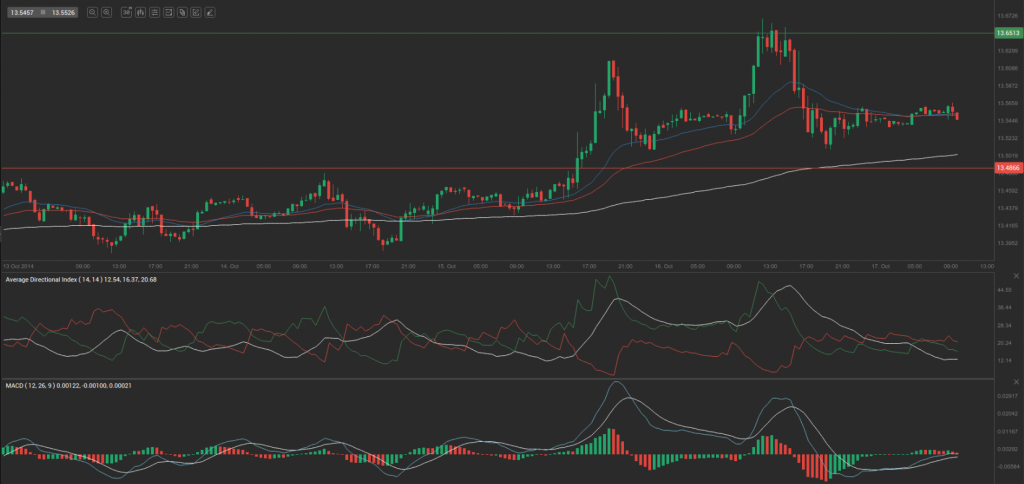Yesterday’s trade saw USD/MXN within the range of 13.5070-13.6720. The pair closed at 13.5587, gaining 0.21% on a daily basis.
At 7:26 GMT today USD/MXN was down 0.03% for the day to trade at 13.5551. The pair touched a daily low at 13.5418 during early Asian trade.
Fundamentals
United States
Housing starts and Building permits
The number of housing starts in the United States probably increased to 1.004 million in September from the seasonally adjusted annual rate of 0.956 million during the prior month. The latter was a 14.4% decrease from the revised July estimate of 1.117 million, or the largest drop since April 2013. Single-family housing starts were at a level of 643 000 in August, or a 2.4% drop compared to the revised July figure of 659 000. The August rate for units in buildings with five units or more was 304 000, according to data by the US Census Bureau.
Housing Starts represent a gauge to measure residential units, on which construction has already begun, every month. A start in construction is defined as the foundation laying of a building and it encompasses residential housing primarily.
The number of building permits in the country probably increased to 1.029 million in September from a revised up annual level of 1.003 million in August (0.998 million previously). Single-family authorizations in August were at a rate of 626 000, or 0.8% lower compared to the revised July figure of 631 000. Authorizations of units in buildings with five units or more were at a rate of 343 000 in August, according to the Census Bureau.
Building permits are permits, issued in order to allow excavation. An increase in the number of building permits and housing starts usually occurs a few months after mortgage rates in the country have been reduced. Permits usually lead housing starts, but are not required in all regions of the United States. Building permits, as an indicator, provide information regarding demand in US housing market. A higher than anticipated number would support the greenback. The official housing data by the US Census Bureau is due out at 12:30 GMT.
Reuters/Michigan Consumer Confidence
The monthly survey by Thomson Reuters and the University of Michigan may show that consumer confidence in the United States slightly worsened in October. The preliminary reading of the corresponding index, which usually comes out two weeks ahead of the final data, probably fell to 84.1 during the current month from a final value of 84.6 in September. The latter has been the highest level since July 2013. The survey encompasses about 500 respondents throughout the country. The index is comprised by two major components, a gauge of current conditions and a gauge of expectations. The current conditions index is based on the answers to two standard questions, while the index of expectations is based on three standard questions. All five questions have an equal weight in determining the value of the overall index.
The sub-index of current economic conditions climbed to a final 98.9 from a preliminary reading of 98.5 in September, after being at 99.8 in August. The latter has been the highest figure since July 2007. The sub-index of consumer expectations came in at a reading of 75.4, slightly below a preliminary value of 75.6 in September, but improving from 71.3, registered in August.
In case the gauge of consumer sentiment decreased at a larger rate than projected, this would reduce demand for the greenback. The preliminary reading is due out at 13:55 GMT.
Mexico
The rate of unemployment in Mexico probably climbed to 5.21% during September, according to the median forecast by experts. In August the rate was reported at 5.18% and in July – 5.47%. In August 94.82% of economically active population was employed, while 7.6% were underemployed.
This indicator represents the percentage of the eligible work force that is unemployed, but is actively seeking employment. The rate of unemployment also reflects overall economic state in the country, as there is a strong correlation between consumer spending levels and labor market conditions. High rates of unemployment are accompanied by weaker spending, which causes an adverse effect on corporate profits and also leads to overall growth deceleration. Therefore, in case the rate of unemployment rose more than expected, this would have a bearish effect on the local currency. Instituto Nacional de Estadística y Geografía is to announce the official rate at 13:00 GMT.
Pivot Points
According to Binary Tribune’s daily analysis, the central pivot point for the pair is at 13.5792. In case USD/MXN manages to breach the first resistance level at 13.6513, it will probably continue up to test 13.7442. In case the second key resistance is broken, the pair will probably attempt to advance to 13.8165.
If USD/MXN manages to breach the first key support at 13.4866, it will probably continue to slide and test 13.4142. With this second key support broken, the movement to the downside will probably continue to 13.3215.
The mid-Pivot levels for today are as follows: M1 – 13.3679, M2 – 13.4504, M3 – 13.5329, M4 – 13.6154, M5 – 13.6979, M6 – 13.7804.
In weekly terms, the central pivot point is at 13.4224. The three key resistance levels are as follows: R1 – 13.5726, R2 – 13.6627, R3 – 13.8129. The three key support levels are: S1 – 13.3323, S2 – 13.1821, S3 – 13.0920.






